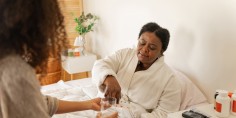She felt self-conscious when she participated in physical activities. She was always teased about her size. She said she “felt sad” every day about her weight.
She was 8.
Dr. Sarah Armstrong, director of Duke University School of Medicine’s Healthy Lifestyles clinic, hears those stories all too often. North Carolina has one of the highest obesity rates in the country, and Armstrong sees the epidemic of childhood obesity firsthand.
In 2006, she helped launch Healthy Lifestyles for children and adolescents and has since developed a community-based wellness program for its participants. She and her team are now focused on replicating that community effort in other areas.
The goal is to reduce obesity, improve health and prevent chronic disease among vulnerable children in the Carolinas. Nearly $750,000 in funding from The Duke Endowment is supporting the work.





